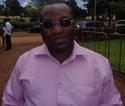Why the University of Dschang?
Dschang is the mother University training agriculturalist in Cameroon and the Central African sub- Region so it's but normal that we start from here.
What benefits will be potent to the local farmers?
As you have observed, this gathering has been able to bring together farmers, researchers and other policy makers, thus they were free to express their problems and as I said earlier on, a concerted effort is usually required to solve problems in holistic approach. The, academia, farmers and the decision makers have the solutions. It will be very useful if we bring all of these solutions together and that is how it will be sustainable.
What are the expectations after this seminar and the field work interactions?
We expect that the farmers, the policy makers, the academia will go back and get to work. We have already established a platform through which we can share ideas and research findings. It will help all of them, academia first, in training those who are going to the field, the farmers, by applying what they have gathered, and get feedback. The policy makers will be better informed to develop policies that will not be sectorial.
What projections for ISMF?
Integrated Soil fertility Management is a strategy. We intend to continue training people on that. We intend to reach out to decision makers who can support our idea or approach of soil fertility management.
Participant. Teba Abel Kemba (Divisional Delegate of Agriculture and Rural Development for Boyo-Fundong) NWR
How positive has been the seminar to you?
I have attended this seminar as a participant from the Boyo, you know this is an idea that the University is putting up to see how we can put together views to solve the problem of soil fertility. If we are talking of second generation agriculture, it cannot be met without improving on the input, which the soil has to give as yield. If the soil is not good we cannot expect better output. This seminar has been very useful to me in the sense that the modules that have been treated are very good and if the package of this seminar doesn't remain in the offices it will go a long way to improve on the productivity that we are expecting from the field.

